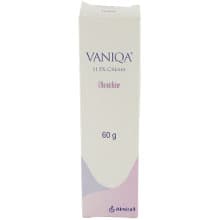Hair Removal: start your consultation
- 1. Answer the online medical questions
- This helps our doctors to decide which treatment is safe for you.
- 2. Select your treatment
- You will see a list of recommended treatments. You can select the one you prefer.
- 3. Checkout and delivery
- Once you’ve completed the checkout, our doctors will review your answers. If all is safe, you will receive your treatment tomorrow.
Available Treatment(s)

- Reduction of facial hair in 80% of cases
- Results in as little as 4-8 weeks
Hirsutism
Hirsutism in women, the causes and treatment available in the UK
Hirsutism is classed as excessive hair growth of female hair, especially on the face, neck and chest. It can also appear in the lower back, pubic line, thighs and buttocks. Whilst excessive and/or darker hair growth is the most common issue related to Hirsutism, the condition can also cause acne and oily skin, and many women call upon treatment to help manage the symptoms of hirustism. Managing causes and triggers can help slow unwanted hair growth as well as treatment to remove hair and control outbreaks.
What is hirsutism?
Hirsutism is excessive hair growth in women that most typically affects the face, neck and chest. It can also appear on the stomach, thighs and buttocks. Whilst we have hair all over our bodies, hirsutism is usually thick and darker than normal hairs. Hirsutism can lead to additional symptoms such as oily skin and acne, all detailed under the Hirsutism Symptoms section below.
Many women look to seek treatment for hirustism to feel more comfortable and confident, and there are also triggers that can be avoided.
Hirsutism causes
According to the NHS, approximately 23% of women with hirsutism show no obvious root cause for the condition. This is otherwise known as idiopathic hirsutism. Whilst figures for the causes of hirsutism aren't clear as many don't seek medical help or treatment, it is thought that polycystic ovary syndrome (PCOS) is responsible for the majority (around 72%) of cases.
Hirsutism is medically caused by the male sex hormone androgens. It is typical for women to have both male and female sex hormones in the body, however if excessive hair growth occurs, it is typically down to the increased androgens such as testosterone, dehydroepiandrosterone and androstenedione. At least half of all women with hirsutism have an increased amount of androgen or sensitivity to a particular male sex hormone.
Other causes include menopausal or premenopausal women, which understandably alters the hormonal balance in women, as well as Cushing's syndrome, being overweight or obese and certain medicines.
What is polycystic ovary syndrome (PCOS)?
PCOS is an imbalance of the sex hormones oestrogen and progesterone in the body, which can lead to infertility, issues with the menstrual cycle and changes in appearance including thinner head hair and excessive hair on the face and body.
Hirsutism symptoms
Excess hair growth is the most commonly reported symptom of hirsutism, and the main symptom women look to treat. Areas of excessive might differ from one woman to the next, however common places include:
- Face
- Neck
- Chest
- Stomach
- Pubic line
- Thighs
- Buttocks
There are additional symptoms other than excessive hair growth can include:
- Acne
- Oily skin
- Head hair thinning or loss (alopecia)
- Deeper voice
- Enlarged clitoris
Treating hirsutism
There is no immediate cure for hirsutism, however, there are treatments to reduce symptoms such as acne and hair growth.
For hair removal
- Shaving – Unlike the popular myth, hair will not grow back thicker and/or darker after shaving. This is quick and easy, although can itch, cause stumble and irritate sensitive skin.
- Waxing – This option require less maintenance than shaving, however, can be painful and cause scarring.
- Plucking and threading – Again, requires less upkeep than shaving as regrowth is slower, however, can be time-consuming and painful.
- Bleaching – Making hair lighter can reduce the severity. Like shaving and waxing, bleaching can irritate sensitive skin.
- Vaniqa – This is the only prescription medication in the UK and is applied as a cream to the face.
- Eflornithine – A cream that is applied and left on the face for up to four hours to help reduce mild hair growth.
- Electrolysis – Although this can lead to scarring, electrolysis permanently removes excessive hair. This option is available at specialist clinics.
- Laser removal – This option can take a number of months and is also available at specialist clinics.
The contraceptive pill
Certain contraceptives such as Dianette have been proven to help reduce the severity of acne, lessening inflammation as well as the number of bouts. This is not an option for menopausal women, however other skincare routines can help ease acne.
Preventing hirsutism
Hirsutism is not preventable as it is caused by a hormone imbalance and not lifestyle choices or other related factors. However, losing weight could help.
- Losing weight - Being overweight or obese increases the amount of androgens needed in the body so taking steps to reduce your weight could help control certain symptoms of hirsutism. If you are obese, or have a BMI or 27 with underlying conditions, you can be prescribed treatment like Xenical.
Buying treatment
Whilst hirsutism is not uncommon, if it is causing anxiety, there is no reason why you should delay finding treatment. At OnlineClinic, we offer medication proven to help stop excessive hair growth on the fair and neck. Vaniqa is a cream that blocks hair production leading to the significant reduction in unwanted facial hair. Based on the advice and encouragement from your doctor, you could also try certain contraceptives to help with acne or a new diet plan. The benefits of treating hirsutism can send confidence soaring so complete an online consultation. Alternatively, you can read more about Vaniqa on our product page.
medical form
medication
prescription
from pharmacy
